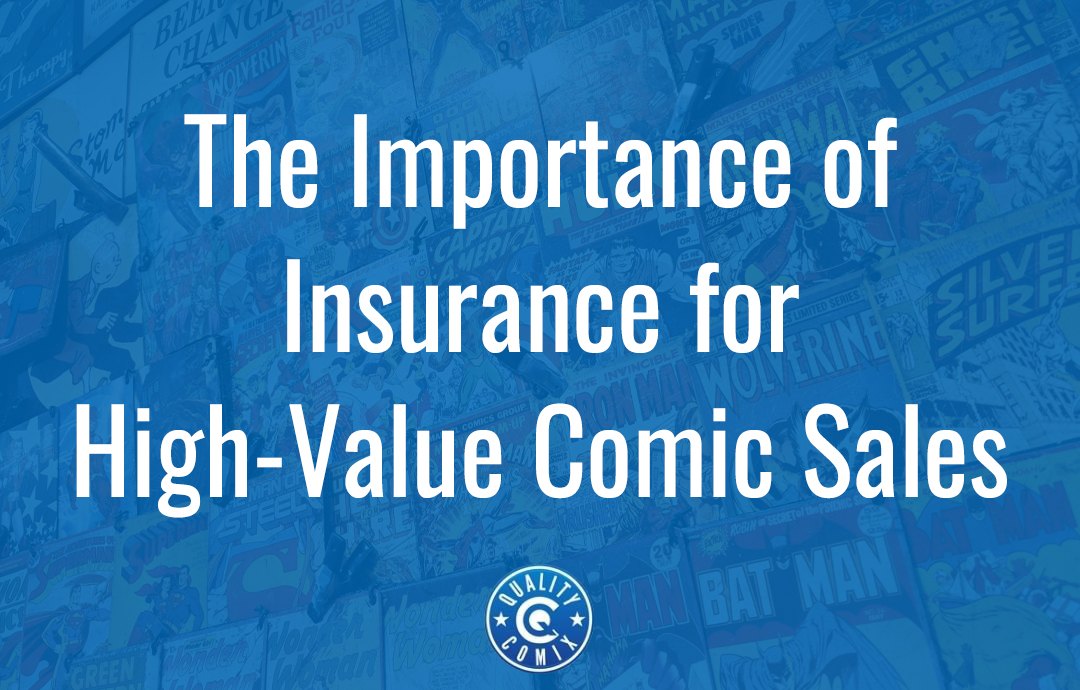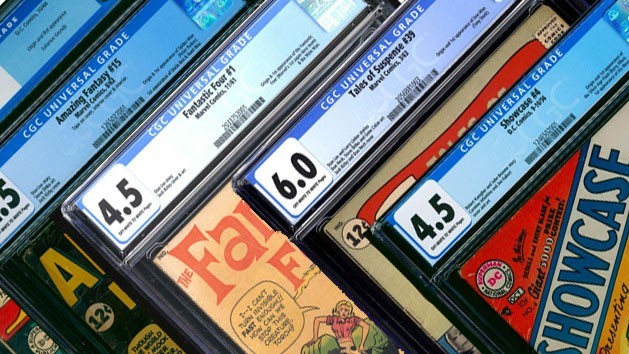
Insurance is an important concept when dealing with anything of value, whether it's a home, car, or high-value collectible. Comic books are no exception.
The tricky part is that insurance comes into play in different ways, and you need to get insurance in different forms for different purposes. On top of that, even if you have insurance of one kind, it might not actually cover what you want it to cover.
Table of Contents
- Three Kinds of Insurance for Comic Books
- The first is your standard homeowner's or renter's insurance.
- The second kind of insurance relevant to comic collectors is comic-specific insurance coverage.
- The third kind of insurance for comics is shipping insurance.
- Do You Need Insurance to Mail Comics?
- What Kind of Insurance Do You Need?
- Shop in Confidence with Quality Comix
Three Kinds of Insurance for Comic Books

When dealing with comic books, there are three kinds of insurance that might cover them, and chances are you'll need all three of them depending on what you're doing and what kind of collection you're dealing with.
The first is your standard homeowner's or renter's insurance.
This is insurance you purchase for your home and the contents of that home. Homeowner's insurance is for people who own their homes and will cover the home and its structure as well as the contents. Renter's insurance only covers the stuff inside the home and not the home itself. That's because the landlord will have their own homeowner's insurance to cover the structure.
Does this kind of insurance cover comic books? The answer is "it depends." Some policies will only cover "everyday items" like clothing, basic electronics, appliances, and so on. Others will cover anything in the home but will have limits; they might not cover collectibles at all, or if they do, they might have a cap on the value that they'll pay out.
"Once a collection becomes valuable, you'll need to see that it's insured properly. What you may not know is that most homeowners insurance policies limit or exclude coverage for artwork and other collectibles. If you have a valuable collection, you may need to seek out separate collectibles insurance." - Investopedia.
It's an all-too-common event for a collector to suffer a catastrophic storm, flood, or fire, damaging their home and their precious comics collection. They file an insurance claim, only to find that the insurance will cover their comics collection up to $5,000… a paltry sum if you're dealing with prized, highly-valuable vintage key issues and golden age high-grades.

At the high end of policies, these kinds of insurance will often cover collectibles up to very high values, with one caveat: you need to have previously informed the insurance company of your collection and what it entails, usually with some kind of proof.
It's reasonable, right? The insurance company doesn't want to have everyone who loses a comic to a fire claim it was a 9.8-graded Action Comics #1 worth millions. Even so, it's a rude surprise for a collector to run into after a tragedy when they thought they were covered.
The second kind of insurance relevant to comic collectors is comic-specific insurance coverage.
This is the kind of insurance you get specifically on a collection of valuable items. There are both comic-specific insurance policies and more general collectibles insurance policies.
Generally, these work the same way as any insurance policy; you buy a policy from an insurer, pay a monthly premium, and your comics collection is insured up to a certain value against damage, loss, theft, or other tragedy.
These policies can range in cost, but the cost is generally going to be tied to the value of the collection in some way. When you purchase a policy, an insurance agent will want to evaluate your comics collection as a whole and will decide how much they will cover. Usually, this is a sum total of the fair market value at the time for the comics; you may need your collection re-appraised every so often to ensure that the values stay accurate.
Collectibles insurance also usually has a "new item" rider; they will, by default, insure a new addition to the collection for up to some value, like $2,000, until it can be appraised. Once appraised, it is then insured for its full value.
Now, if you have a comics collection of a few dozen $5 books, you really aren't going to need a collectibles policy on them. But, if you're routinely dealing with books worth $500, $1,000, $5,000, or more – especially the very valuable graded keys from the early days of comics – you're going to want a dedicated kind of insurance.

Image source: Reddit
Note: One of the biggest benefits of collectibles insurance is that they aren't very likely to fight you over the value of the collection. Traditional insurance companies for standard homeowner's or renter's insurance tend to do everything they can to minimize the claimed value of everything they pay out, both because they need to pay out much more often than specialized insurance and because they need to minimize their own costs. Collectibles insurance, meanwhile, recognizes the value of a collectible and will pay what they cover.
Collectibles or comics insurance will cover your collection against natural disasters, theft from your home or vehicle, and usually, damage or loss if the comics are stored elsewhere (like in a safety deposit box or off-site storage unit.) They can also cover your comics if they are damaged in transit, like if you're moving, flying to a convention, or taking them on a road trip to a show.
"Comic book insurance policies may also provide coverage for your collection outside of your home as well. For example, you can customize a policy to cover your items while they are in transit through the mail, while you are traveling with them, while they are stored in a facility, or while they are on display at an exhibit. This can provide additional protection for your valuable items, ensuring that they are covered in a variety of different situations." - Oyster.
An added bonus is that if you collect something other than comics – sports jerseys, trading cards, stamps, coins, antiques – they can be covered as well, all under the same policy.
The third kind of insurance for comics is shipping insurance.
Whenever you buy or sell a comic online, unless it's a very special comic and is going to be hand-delivered or picked up in person, chances are it's going to be sent through the mail. This might be through a service like FedEx, UPS, or DHL, or it might just be through the United States Post Office. There are also international shipping companies for those who buy and sell from further afield.
Now, it's no secret that the shipping and mail industry is hard on packages. What many people don't know is just how hard it is. The inside of a UPS or FedEx facility would surprise many with how little care is taken for most packages. Boxes cascade down roller ramps to hoppers and are jostled and slammed into by other packages. Boxes are stacked on top of one another. Things are tossed, tipped, shoved, slid, spun, and everything else.
Don't blame the workers, of course. Chronic under-staffing across the entire industry, vastly increased shipping all across the board with global commerce, it all adds up. We're straining our infrastructure well past where anything reasonable would have broken, and it's a testament to the quality of these systems that it all still functions as well as it does.

What this means is that there's always going to be some risk of damage in transit. Even if you pack your box well and it ships just fine, someone who didn't properly pack their ten-gallon jugs of grape juice and had them explode all over a hundred other boxes can do a lot of damage, and that's to say nothing of the caustic chemicals and other things being shipped every day.
And, of course, you then have the risk of things like package theft, a label being damaged and a package being lost, theft from a mail carrier's vehicle, and so on.
The entity you use to ship your comics will generally offer some kind of insurance. Most have a "default" insurance that comes with using their service, but the coverage is small – usually only up to $100 or so. From there, you can purchase additional coverage up to a point. For example, the USPS offers up to $5,000 in insurance coverage on a package. If you use Registered Mail instead (which costs more to ship), the maximum value can go up to $50,000. For many keys and other valuable comics, this is plenty, but not for the highest of the high-value comics.
Shipping insurance is, of course, only available when you mail a package that contains the item in question. You need to have proof of the value of the item, you need to pay for the coverage, and the recipient needs to file the claim if something goes wrong. Along the way, there can be other entities at play, like banks or PayPal, if payment disputes come up.
Do You Need Insurance to Mail Comics?
Almost always, the answer is yes.
If you're mailing out a bunch of $1 bin comics, you probably don't need insurance.
"The casual comic book enthusiast with a handful of comics worth $20 or $30 does not typically need insurance for comic books. If the books were damaged or lost, replacing them would not present a significant financial hardship." - Verified.
Beyond that, though, yes. Insurance is a big part of making sure that there's recourse if your comics are damaged or lost in transit. Note that it doesn't make the shipping itself any faster or better – the process is still the same – it just gives you an option if something happens.

This holds doubly true if you're mailing high-value comics. Where you set that threshold is up to you – and, to an extent, the buyer – but usually, anything over the basic limits of the shipping companies is a good rule of thumb. If the value of the comics you're mailing exceeds $100, let alone $1,000, insurance is quite possibly a good idea.
What Kind of Insurance Do You Need?
Here's one that many people might not know: you may not need to buy insurance on the package when you ship a comic.
First, we can eliminate homeowner's or renter's insurance. These are pretty much never going to cover items in shipping since they don't even cover items outside of your home. They aren't designed for it.
Shipping insurance from a shipping company is fine, but it can get expensive quickly, especially if you're shipping a lot of valuable comics to a lot of different places in a lot of different packages. You can't just buy one policy to cover all of the packages in a batch, after all; you need to pay for each one individually.
At the same time, shipping company insurance tops out well below what the most truly valuable comics are worth. Now, are you going to be shipping a comic worth $200,000 via the USPS? Maybe, maybe not. Oftentimes, these things are handled privately and a lot more carefully.

That leaves collectible insurance. Good collectible insurance policies actually do cover comics in shipping. This includes both shipping to a buyer and shipping to the insurance company for evaluation. It may also include shipping to and from a company like CGC, though that may be its own matter.
The benefit of this kind of insurance is primarily the higher actual value coverage. If you're going to exceed the USPS cap on a package, using collectibles insurance is the better option.
In the event that a high-value sale goes awry, you will generally want to be candid with the buyer. Make things right with them by refunding their money (assuming, of course, that they aren't trying to pull a fast one on you about an item not being delivered when you have proof it was – always get proof of delivery for valuable comic sales) and, once that is done, file your insurance claim. After going through the claim process, you'll be reimbursed for your lost item and can replace it if that's what you choose.
Shop in Confidence with Quality Comix
If you're in the market for high-end comics, you can shop in confidence by ordering from our shop. Since you choose the shipping, you're free to get whatever insurance you like on the packages.

And, if you want to sell your valuable comics to us, any collectibles insurance policy should cover it until it arrives. Pick what's right for you! Just don't let your valuable comics go uncovered.



